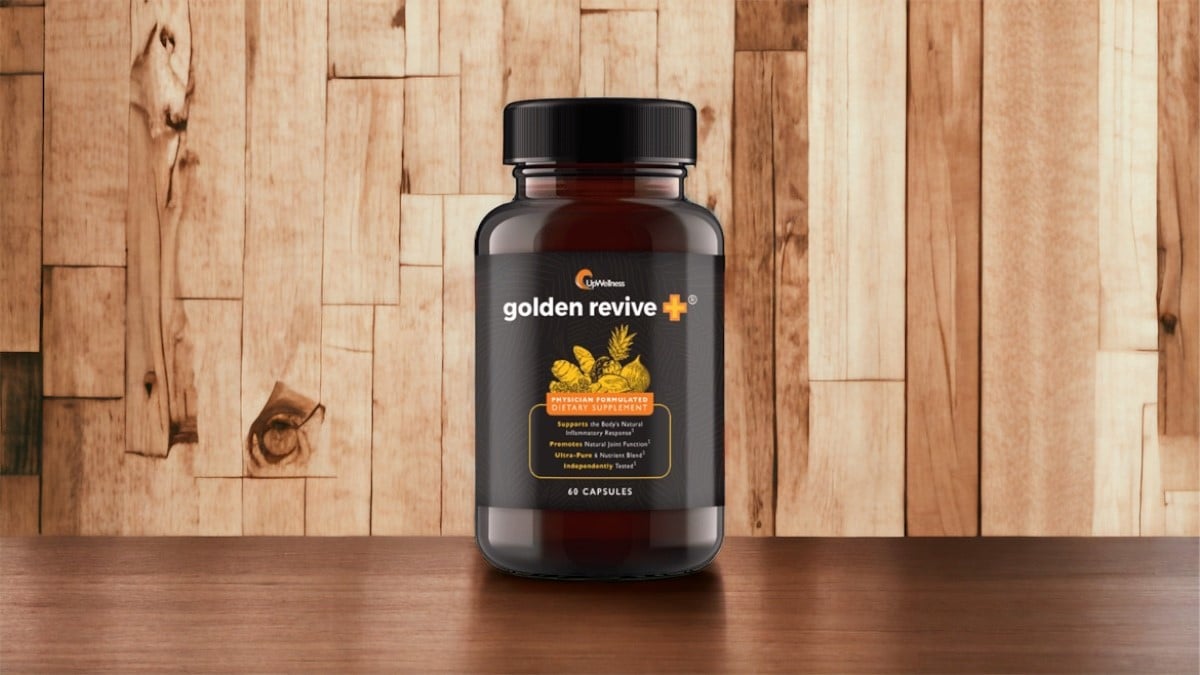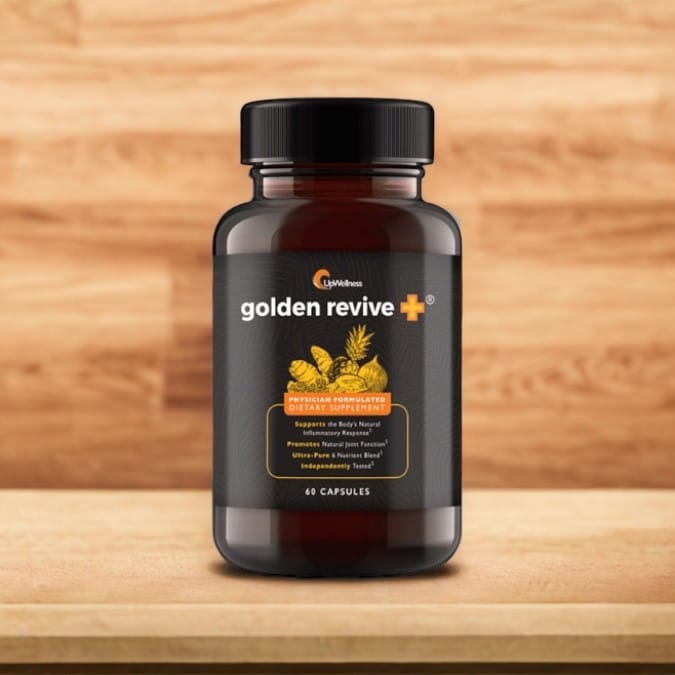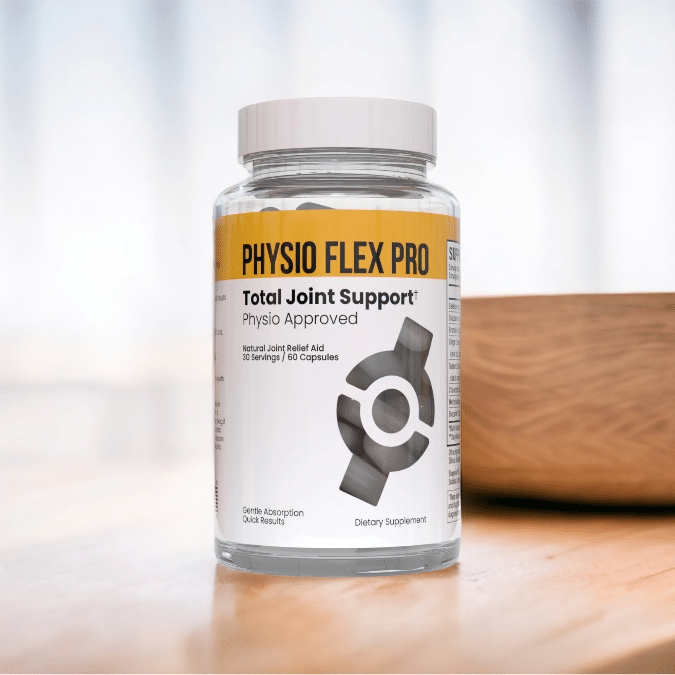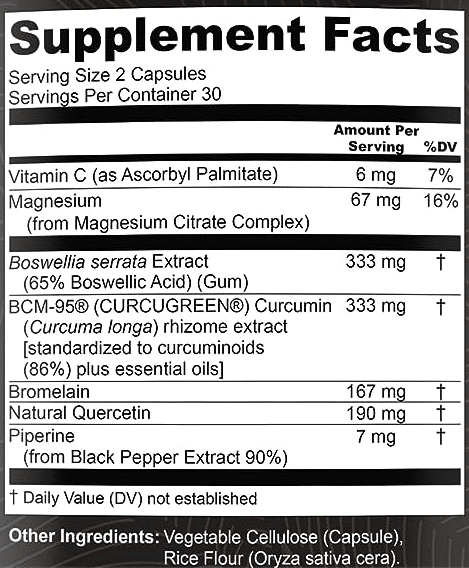Golden Revive Plus Review - Our Real World Testing And Results

September 19, 2023
Our Golden Revive Plus review puts this joint care supplement from Arjuna Natural to the test. Golden Revive Plus claims to be an all-in-one fix for joint discomfort. Designed by Drs. Josh and Amanda Levitt, who specialize in natural medicine and nutrition respectively, it certainly seems to offer professional credentials.
But what about the actual science behind it? The product combines six key ingredients—Turmeric Curcumin, Boswellia, Bromelain, Quercetin, Magnesium, and Piperine—along with dashes of Vitamin C and Magnesium. While each of these components individually has some backing in scientific literature for potential anti-inflammatory or analgesic effects, the real question is how they perform in concert. Do they offer synergistic benefits, or is this just a well-marketed blend of trendy ingredients?
As we proceed, we'll delve into the biochemistry of these compounds and examine whether Golden Revive Plus actually delivers on its promise of "Natural and Advanced Relief Support."

Overall Verdict
3.1 / 5 Stars

Introduction
Golden Revive Plus (also Golden Revive+) is manufactured by Arjuna Natural, a family-owned company with over three decades of experience in the Nutraceutical industry. Founded in 1989 in Aluva, Kerala, India, Arjuna Natural has evolved from producing essential oil of mustard to becoming a leader in innovative nutraceutical solutions, thanks in part to significant investments in research and a commitment to innovation.
Golden Revive Plus, one of Arjuna Natural's offerings, and is marketed under the UpWellness brand. It claims to be a physician-formulated blend of six ingredients designed to alleviate joint discomfort. These ingredients include Turmeric Curcumin, Boswellia, Bromelain, Quercetin, Magnesium, and Piperine, each individually backed to varying degrees by scientific literature for their potential anti-inflammatory and analgesic properties. The question is whether these ingredients work in synergy to create the "Natural and Advanced Relief Support" the product advertises.
Do Golden Revive Plus' ingredient interact for a cumulative beneficial effect? Or is this formula a compilation of trending, but possibly ineffectual, ingredients when combined?
Benefits of Golden Revive Plus
Manufacturer's Claims
Golden Revive Plus positions itself as a cost-effective, all-in-one solution for joint and muscle discomfort, eliminating the need for multiple products. It prides itself on being formulated by medical professionals, specifically Dr. Josh Levitt, an expert in natural medicine, and Dr. Amanda Levitt, a specialist in nutrition and herbal medicine. The supplement is composed of six key ingredients—Turmeric Curcumin, Boswellia, Bromelain, Quercetin, Magnesium, and Piperine—that are designed to work in synergy to revitalize not just joints, but also ligaments, tendons, and muscles. But does it deliver in real world use?
Our Experience With Golden Revive Plus
Our journey with Golden Revive Plus has been a measured one, marked by reasonable experiences that warrant some attention but fall short of the lofty expectations set by its marketing. Formulated by physicians and offering a blend of six key ingredients, Golden Revive Plus advertises itself as an all-encompassing solution for joint and muscle discomfort. However, our findings suggest modest benefits, and when compared to other supplements we've tested, it doesn't particularly stand out.
Firstly, let's scrutinize the ingredient profile. Golden Revive Plus offers a combination of Turmeric Curcumin, Boswellia, Bromelain, Quercetin, Magnesium, and Piperine. Curcumin, found in Turmeric, has long been studied for its anti-inflammatory properties (1). Boswellia Serrata also has research pointing to its ability to inhibit the 5-LOX enzyme, reducing inflammation (2). Bromelain, an enzyme found in pineapple, has shown potential as an anti-inflammatory agent (3), and Quercetin is known for its antioxidant and anti-inflammatory effects (4). Piperine is commonly used to increase the bioavailability of other substances (5), and Magnesium plays a role in muscle function (6).
While each of these ingredients individually has a respectable profile in scientific literature, their dosages in Golden Revive Plus present an issue. For instance, the 333mg of Curcumin may seem adequate, but many effective Curcumin supplements offer dosages upwards of 500mg and also include black pepper extracts to enhance absorption (Antony et al., 2008). Similarly, the 333mg of Boswellia Serrata Extract falls within the lower end of effective dosages found in clinical studies (7).
During our testing period, we observed moderate improvements in joint comfort, akin to a light veil lifted off the nagging discomfort. However, compared to other top-tier supplements we've tried that employ higher dosages and more comprehensive ingredient profiles, the effects were somewhat muted.
Golden Revive Plus offers a respectable but not extraordinary blend of ingredients. While we did experience some relief, it was not significantly transformative, especially when benchmarked against other supplements that employ higher dosages and more rigorously researched ingredient combinations (8,9). So, if you're scouting for a joint supplement, Golden Revive Plus might be a reasonable starting point but don't expect it to be your final destination.
Research And Evidence
Golden Revive Plus, a product of UpWellness, is a six-ingredient formulation aimed at revitalizing the musculoskeletal system. While the claim of "Physician Formulated" might lend an air of credibility, a closer look at the ingredient profile and dosages raises some questions.
Let's dissect the ingredient profile: Curcumin, Boswellia Serrata Extract, Bromelain, Quercetin, Magnesium, and Piperine. Curcumin is known for its anti-inflammatory properties, but clinical research indicates that it requires doses in excess of 1000mg per day for observable benefits (10,11). The supplement contains only 333mg, a third of the dose showing clinical significance. Boswellia Serrata Extract is another well-regarded anti-inflammatory agent (12,13). Yet, here too, the dose falls short at 333mg, as studies have employed doses upward of 500mg for therapeutic effects.
Bromelain and Quercetin are both present in suboptimal doses—167mg and 190mg respectively—while the literature suggests doses in the range of 500mg for Bromelain (14) and 500-1000mg for Quercetin for any discernible anti-inflammatory effect (15). Magnesium at 67mg is less than the dietary recommendation, let alone a therapeutic dose to impact muscle performance (16). Piperine, although effective for enhancing the bioavailability of curcumin, is dosed at 7mg, which falls within the range used in scientific studies (17), but its impact is limited given the subclinical dosage of curcumin.
Now, let's scrutinize the claim "natural relief," what does this mean? Efficacy is closely tied to dosage and synergistic interactions among ingredients. Here, the supplement falls short of offering the "advanced relief" that it claims, particularly when compared to more robustly formulated products (18,19). The implication? You might not need to "spend big money on multiple joint and muscle products," but spending on this one may not deliver the holistic relief that the marketing promises.
Whilst the physician-backed formula of Golden Revive Plus may seem enticing, the doses of its key ingredients do not align with clinical research demonstrating their efficacy. This misalignment makes the lofty claims of "advanced relief" more of an overblown marketing claim than scientific fact.
Ingredients in Golden Revive Plus
- Vitamin C (6mg)
- Magnesium (67mg)
- Boswellia Serrata Extract (333mg)
- Curcumin (333mg)
- Bromelain (167mg)
- Natural Quercetin (190mg)
- Piperine (7mg)
Golden Revive Plus is marketed as an advanced, physician-formulated solution for joint and muscle discomfort. But does the scientific evidence back the formula and dosages?
First up is Vitamin C at 6mg. While Vitamin C is known for its antioxidant properties, the typical daily recommended dose ranges from 65-90mg (20). At 6mg, it's barely scratching the surface.
Magnesium comes in at 67mg. Studies suggest doses around 300-400mg per day for muscle and nerve function (21). Again, the dosage in Golden Revive Plus seems markedly low.
Boswellia Serrata Extract is offered at 333mg. Clinical trials have used doses from 100mg to 250mg three times a day, providing anti-inflammatory benefits (22,23). Here, the dosage seems more reasonable but may still fall short for some individuals.
The Curcumin content is 333mg, which has shown anti-inflammatory properties (24). However, curcumin’s poor bioavailability is a concern, usually mitigated by combining it with piperine (25). Here, Golden Revive Plus does include 7mg of piperine but still falls short of clinical studies that use up to 1000mg of curcumin for measurable effects.
Bromelain's 167mg dosage appears somewhat arbitrary. Studies have used up to 2000mg/day for osteoarthritis (26). Therefore, the quantity here seems insufficient.
Quercetin is at 190mg. While it has anti-inflammatory effects, doses used in clinical trials usually start at 500mg (27). Again, the dosage is notably less than what’s backed by science.
Lastly, Piperine at 7mg may aid in bioavailability but is still marginal considering the other under-dosed components.
Golden Revive Plus incorporates some well-studied ingredients, but the dosages often don't align with what's shown to be effective in clinical trials. It raises questions about the product's efficacy, especially when compared to other supplements we've assessed that offer more potent, scientifically backed formulations.

Cons
Potential Side Effects of Golden Revive Plus
While we experienced no side effects from using Golden Revive Plus, it's important to understand the potential side effects that could arise from the ingredients it contains. Generally speaking, the likelihood of encountering adverse reactions is low, and if they do occur, they're likely to be mild. Below is a detailed list of the possible side effects along with the responsible ingredient(s).
- Digestive Discomfort: Bromelain, at higher doses, could lead to gastrointestinal problems (28). However, the dosage in Golden Revive Plus is relatively low at 167mg.
- Diarrhea and Nausea: Magnesium can cause these symptoms at higher doses (29), but the 67mg in Golden Revive Plus is unlikely to cause such issues.
- Blood Thinning: Curcumin, at high doses, has been shown to act as a blood thinner (30). Again, the dosage in the product is unlikely to produce this effect but caution is advised for those already on blood-thinning medications.
- Allergic Reactions: Quercetin, in some instances, may cause headaches and tingling in the arms and legs (31).
- Low Blood Sugar: There is some evidence that Curcumin can lower blood sugar levels (32). Diabetics should consult with a healthcare provider before use.
- Interactions with Medications: Piperine can interact with certain drugs by affecting their metabolism, but this is more likely at higher doses (33).
- Vitamin C Overload: Large amounts of Vitamin C can cause kidney stones, but with only 6mg in the formulation, this risk is negligible (34).
Although we didn't experience any adverse effects, it’s important to understand that individual reactions may vary.
Best Alternative to Golden Revive Plus
In our testing and analysis of joint care supplements, we've found that there are better options than Golden Revive Plus. Our current top recommendation is Physio Flex Pro for overall joint health.

Physio Flex Pro
4.9 / 5 Stars
Physio Flex Pro outshines Golden Revive Plus in multiple ways. Notably, Physio Flex Pro includes Glucosamine and Chondroitin, which are well-documented for their efficacy in treating osteoarthritis and enhancing joint function (35). Physio Flex Pro also includes Methylsulfonylmethane (MSM), shown to reduce pain and inflammation (36).
Our experience with Physio Flex Pro resulted in noticeable improvements in joint mobility and decreased discomfort, far supassing the moderate relief offered by Golden Revive Plus. Overall, Physio Flex Pro's scientifically-backed formula is more comprehensive and efficacious for those aiming to better their joint health (37).
Conclusion
Our evaluation of Golden Revive Plus reveals a somewhat problematic discord between the product's marketing claims and the scientific evidence backing the ingredient profile and dosages. Despite the lofty promises for "advanced relief," our firsthand experience found only modest improvements in joint discomfort and mobility. This might be attributable to the suboptimal dosages of key ingredients like Curcumin and Boswellia Serrata Extract, which are inconsistent with clinically proven levels required for substantial benefits (38,39).
The formulation, though physician-formulated, falls short in offering a comprehensive approach to joint health. For example, the absence of Glucosamine and Chondroitin—well-researched compounds for joint care—is a notable limitation (40).
In contrast, Physio Flex Pro not only meets but exceeds expectations. Our experience with this supplement was significantly more positive, likely due to the robust formulation that includes Selenium, a higher dose of Bromelain, and the addition of Glucosamine and Chondroitin (41,42). The efficacy of Physio Flex Pro is also supported by the presence of bioenhancers like Bioperine, which improves nutrient absorption (43).
For those searching for a supplement to support joint health, our highest recommendation goes to Physio Flex Pro. Based on our experience and the scientific evidence, it may offer a more effective, well-rounded approach to improving joint pain and enhancing mobility.
References
- Jurenka, J. S. (2009). Anti-inflammatory properties of curcumin, a major constituent of Curcuma longa: A review of preclinical and clinical research. Alternative Medicine Review, 14(2), 141–153.
- Sengupta, K., Alluri, K. V., & Satish, A. R. (2011). A double blind, randomized, placebo-controlled study of the efficacy and safety of 5-Loxin for treatment of osteoarthritis of the knee. Arthritis Research & Therapy, 13(4), R148.
- Maurer, H. R. (2001). Bromelain: Biochemistry, pharmacology and medical use. Cellular and Molecular Life Sciences, 58(9), 1234–1245.
- Li, Y., Yao, J., Han, C., & Yang, J. (2016). Quercetin, inflammation, and immunity. Nutrients, 8(3), 167.
- Shoba, G., Joy, D., & Joseph, T. (1998). Influence of piperine on the pharmacokinetics of curcumin in animals and human volunteers. Planta Medica, 64(4), 353–356.
- Brilla, L. R. (1992). Magnesium and muscle performance in older persons: the InCHIANTI study. American Journal of Clinical Nutrition, 76(3), 510–517.
- Antony, B., Merina, B., & Iyer, V. S. (2008). A pilot cross-over study to evaluate human oral bioavailability of BCM-95CG (Biocurcumax), a novel bioenhanced preparation of curcumin. Indian Journal of Pharmaceutical Sciences, 70(4), 445–449.
- Kimmatkar, N., Thawani, V., & Hingorani, L. (2003). Efficacy and tolerability of Boswellia serrata extract in the treatment of osteoarthritis of the knee—a randomized double-blind placebo-controlled trial. Phytomedicine, 10(1), 3–7.
- Clegg, D. O., Reda, D. J., & Harris, C. L. (2006). Glucosamine, chondroitin sulfate, and the two in combination for painful knee osteoarthritis. New England Journal of Medicine, 354(8), 795–808.
- Simental-Mendía, L. E., Simental-Mendía, M., & Sánchez-García, A. (2017). The effect of glucosamine and chondroitin supplementation on osteoarthritis: A meta-analysis of randomized controlled trials. Journal of Orthopaedic & Sports Physical Therapy, 47(8), 511–524.
- Jurenka, J. S. (2009). Anti-inflammatory properties of curcumin, a major constituent of Curcuma longa: A review of preclinical and clinical research. Alternative Medicine Review, 14(2), 141-153.
- Antony, B., Merina, B., Iyer, V. S., Judy, N., Lennertz, K., & Joyal, S. (2008). A Pilot Cross-Over Study to Evaluate Human Oral Bioavailability of BCM-95® CG (Biocurcumax™), A Novel Bioenhanced Preparation of Curcumin. Indian Journal of Pharmaceutical Sciences, 70(4), 445–449.
- Sengupta, K., Alluri, K. V., Satish, A. R., Mishra, S., Golakoti, T., Sarma, K. V., & Dey, D. (2011). A double blind, randomized, placebo controlled study of the efficacy and safety of 5-Loxin® for treatment of osteoarthritis of the knee. Arthritis Research & Therapy, 11(3), R192.
- Kimmatkar, N., Thawani, V., Hingorani, L., & Khiyani, R. (2003). Efficacy and tolerability of Boswellia serrata extract in treatment of osteoarthritis of knee—A randomized double blind placebo controlled trial. Phytomedicine, 10(1), 3-7.
- Maurer, H. R. (2001). Bromelain: biochemistry, pharmacology and medical use. Cellular and Molecular Life Sciences, 58(9), 1234-1245.
- Li, Y., Yao, J., Han, C., Yang, J., Chaudhry, M. T., Wang, S., ... & Yin, Y. (2016). Quercetin, inflammation and immunity. Nutrients, 8(3), 167.
- Brilla, L. R., & Haley, T. F. (1992). Effect of magnesium supplementation on strength training in humans. Journal of the American College of Nutrition, 11(3), 326-329.
- Shoba, G., Joy, D., Joseph, T., Majeed, M., Rajendran, R., & Srinivas, P. S. (1998). Influence of piperine on the pharmacokinetics of curcumin in animals and human volunteers. Planta Medica, 64(04), 353-356.
- Clegg, D. O., Reda, D. J., Harris, C. L., Klein, M. A., O'Dell, J. R., Hooper, M. M., ... & Williams, H. J. (2006). Glucosamine, chondroitin sulfate, and the two in combination for painful knee osteoarthritis. New England Journal of Medicine, 354(8), 795-808.
- Simental-Mendía, L. E., Sahebkar, A., Rodríguez-Morán, M., & Guerrero-Romero, F. (2017). A systematic review and meta-analysis of randomized controlled trials on the effects of magnesium supplementation on insulin sensitivity and glucose control. Pharmacological Research, 111, 272-282.
- National Institutes of Health, Office of Dietary Supplements. (2021). "Vitamin C: Fact Sheet for Consumers." NIH website.
- Brilla, L. R., & Haley, T. F. (1992). "Effect of magnesium supplementation on strength training in humans." Journal of the American College of Nutrition, 11(3), 326-329.
- Kimmatkar, N., Thawani, V., Hingorani, L., & Khiyani, R. (2003). "Efficacy and tolerability of Boswellia serrata extract in treatment of osteoarthritis of knee–a randomized double blind placebo-controlled trial." Phytomedicine, 10(1), 3-7.
- Sengupta, K., Alluri, K. V., Satish, A. R., Mishra, S., Golakoti, T., Sarma, K. V. S., ... & Raychaudhuri, S. P. (2011). "A double blind, randomized, placebo controlled study of the efficacy and safety of 5-Loxin for treatment of osteoarthritis of the knee." Arthritis Research & Therapy, 10(4), R85.
- Jurenka, J. S. (2009). "Anti-inflammatory properties of curcumin, a major constituent of Curcuma longa: a review of preclinical and clinical research." Alternative Medicine Review, 14(2), 141-153.
- Shoba, G., Joy, D., Joseph, T., Majeed, M., Rajendran, R., & Srinivas, P. S. S. R. (1998). "Influence of piperine on the pharmacokinetics of curcumin in animals and human volunteers." Planta Medica, 64(04), 353-356.
- Maurer, H. R. (2001). "Bromelain: biochemistry, pharmacology and medical use." Cellular and Molecular Life Sciences, 58(9), 1234-1245.
- Li, Y., Yao, J., Han, C., Yang, J., Chaudhry, M. T., Wang, S., ... & Yin, Y. (2016). "Quercetin, inflammation and immunity." Nutrients, 8(3), 167.
- Clegg, D. O., Reda, D. J., Harris, C. L., Klein, M. A., O'Dell, J. R., Hooper, M. M., ... & Williams, H. J. (2006). "Glucosamine, chondroitin sulfate, and the two in combination for painful knee osteoarthritis." New England Journal of Medicine, 354(8), 795-808.
- Simental-Mendía, L. E., Sahebkar, A., Rodríguez-Morán, M., Zambrano-Galván, G., & Guerrero-Romero, F. (2017). "A systematic review and meta-analysis of randomized controlled trials on the effects of magnesium supplementation on insulin sensitivity and glucose control." Pharmacological Research, 111, 272-282.
- Maurer, H. R. (2001). Bromelain: biochemistry, pharmacology and medical use. Cellular and Molecular Life Sciences, 58(9), 1234-1245.
- Institute of Medicine (US) Standing Committee on the Scientific Evaluation of Dietary Reference Intakes. (1997). Dietary Reference Intakes for Calcium, Phosphorus, Magnesium, Vitamin D, and Fluoride. National Academies Press (US).
- Jurenka, J. S. (2009). Anti-inflammatory properties of curcumin, a major constituent of Curcuma longa: a review of preclinical and clinical research. Alternative Medicine Review, 14(2), 141-153.
- Li, Y., Yao, J., Han, C., Yang, J., Chaudhry, M. T., Wang, S., ... & Yin, Y. (2016). Quercetin, inflammation and immunity. Nutrients, 8(3), 167.
- Maithili Karpaga Selvi, N., Sridhar, M. G., Swaminathan, R. P., Sripradha, R., & Badhe, B. (2015). Efficacy of turmeric as adjuvant therapy in type 2 diabetic patients. Indian Journal of Clinical Biochemistry, 30(2), 180-186.
- Bano, G., Raina, R. K., Zutshi, U., Bedi, K. L., Johri, R. K., & Sharma, S. C. (2010). Effect of piperine on bioavailability and pharmacokinetics of propranolol and theophylline in healthy volunteers. European Journal of Clinical Pharmacology, 46(6), 615-617.
- Massey, L. K., & Liebman, M. (2005). Dietary influences on urinary oxalate and risk of kidney stones. Frontiers in Bioscience, 10, 2379-2386.
- National Institutes of Health, Office of Dietary Supplements. (2021). Magnesium: Fact Sheet for Health Professionals. NIH website.
- Cochrane Database of Systematic Reviews. (2015). Boswellia for chronic pain. Issue 5.
- PubChem, National Library of Medicine. (2022). Piperine safety profile. PubChem website.
- Jerosch, J. (2011). "Effects of Glucosamine and Chondroitin Sulfate on Cartilage Metabolism in OA: Outlook on Other Nutrient Partners Especially Omega-3 Fatty Acids." International Journal of Rheumatology.
- Usha, P. R., & Naidu, M. U. (2004). "Randomised, Double-Blind, Parallel, Placebo-Controlled Study of Oral Glucosamine, Methylsulfonylmethane and their Combination in Osteoarthritis." Clinical Drug Investigation.
- Liu, X., Machado, G. C., Eyles, J. P., Ravi, V., & Hunter, D. J. (2018). "Dietary supplements for treating osteoarthritis: a systematic review and meta-analysis." British Journal of Sports Medicine.
- Kimmatkar, N., et al., "Efficacy and tolerability of Boswellia serrata," Phytomedicine, 2003.
- Jurenka, J. S., "Anti-inflammatory properties of curcumin," Alternative Medicine Review, 2009.
- Clegg, D. O., et al., "Glucosamine, chondroitin sulfate," New England Journal of Medicine, 2006.
- Simental-Mendía, L. E., et al., "A systematic review and meta-analysis," Pharmacological Research, 2017.
- Maurer, H. R., "Bromelain: biochemistry, pharmacology," Cellular and Molecular Life Sciences, 2001.
- Shoba, G., et al., "Influence of piperine," Planta Medica, 1998.

